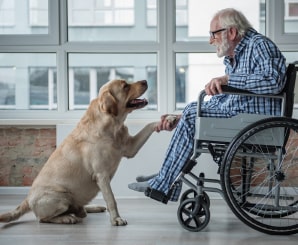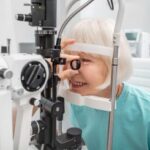The Science of Pets
Almost 65% of American households have at least one pet. That means that your loved one likely has benefited at some point from having a pet in their lives. If this was a positive experience for them, you might want to consider some form of pet therapy for their senior years.
Source: The National Center for Biotechnology Information
The American Heart Association has issued an official statement that pet ownership, specifically of dogs, may reduce the risk of cardiovascular disease, systemic hypertension, obesity, and complications from nervous system disorders.

Animal Assisted Therapies
While our loved ones may not be able to care for a pet, that doesn’t mean that their lives can’t benefit from other solutions. Animal Assisted Activities and Animal Assisted Therapy are two therapies that are worth researching for your older adult.
Animal Assisted Activities are informal interactions such as animal visitation programs that can include a variety of different types of animals such as rabbits, hamsters, birds, dogs, cats or even farm animals. These sorts of visits have been associated with reduced depression and increased happiness. In addition to the interactions with the animals, the human interaction during the visits can help combat loneliness.
Animal Assisted Therapy is a more structured therapeutic intervention that is directed by health professionals with specific goals for the interactions. These goals can be physical, mental, emotional and/or social. The most common animals used are dogs, cats, and horses, but other animals may also be used for specific mobility goals. There is often a better chance that Animal Assisted Therapy will be covered by insurance.
Source: The National Center for Biotechnology Information and Therapet

Considerations For Pets In a Home
While there are many advantages to having a pet in the home, there are some things to consider.
- Pets can create a tripping hazard—either themselves or the toys that they bring out.
- If there is a level of dementia or Alzheimers’, the pets feeding schedules can be skewed toward either too much or too little food.
- Pets provide additional cleaning duties that can be overwhelming.
Ensure that, if your loved one has a pet, they also have resources to help them care for the pet, even if that pet is a fish.
Source: BrightFocus Foundation

Pets Interaction and Science
The science behind why pet interactions work is undeniable and fascinating. Just 15 minutes of bonding time with an animal sets off a chemical reaction in the brain that lowers cortisol and increases serotonin. This causes heart rate, blood pressure and stress to drop.
If your loved one is physically capable, walking a dog is a fabulous form of cardiovascular exercise. However, even if that is beyond their current abilities, there is also a physical and emotional benefit that can come from brushing, petting, and feeding a pet. Caring for another being can provide a sense of worth and engagement in the world. The small motor movements required for these activities can provide dexterity in a non-pressured, non-therapeutic environment.
There is some evidence that pet therapy can be used successfully for loved ones who experience Sundowner’sSyndrome; a period in the evening of increased agitation and confusion often suffered by those with Alzheimer’s. If it is safe for the animal, having an animal around during that time, might give your loved one focus, a feeling of acceptance, a being that doesn’t expect verbal communication, and memories of pets that they might have had in their youth.
Do not discount the advantage of pets other than cats and dogs. One study of patients in an Alzheimer’s facility found that after introducing an aquarium into their dining hall, the patients experienced higher food intake and weight gain and needed less nutritional supplementation. Consider how a tank with fish might be helpful for your own loved one in their home.
Source: A Place for Mom and Human Animal Bond Research Institute




 Call:
Call: 












